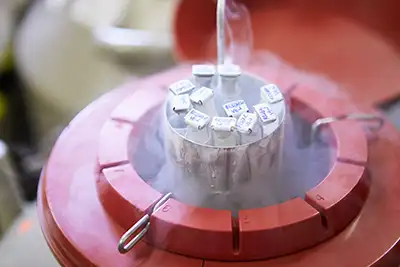Answers to the Most Common CooperSurgical IVF Lawsuit Questions for North Carolina Residents

Here you will find answers to common CooperSurgical IVF lawsuit questions for North Carolina residents, compiled by attorneys representing North Carolina claims. While the information on this page will apply to most embryo loss claims in North Carolina, we are also happy to discuss your case in detail or ask specific questions related to your circumstances. Our team of attorneys handling North Carolina CooperSurgical IVF lawsuit claims provides free, no obligation case review. Simply contact our firm and one of our experienced lawyers handling CooperSurgical IVF lawsuit claims for North Carolina embryo loss will contact you in the near future to answer your questions, completely free of charge.
Who can make an embryo loss claim in North Carolina or file a North Carolina CooperSurgical IVF lawsuit?
Any person or couple in North Carolina who lost one or more embryos during the IVF process as a result of CooperSurgical's defective culture medium may be eligible to make a claim by filing an embryo loss lawsuit against the CooperSurgical.
How do I know if my embryo loss in North Carolina was a result of CooperSurgical's IVF solution recall?
Your North Carolina fertility clinic or healthcare provider for fertility treatment in North Carolina will be able to confirm this information. CooperSurgical's defective IVF culture media affected embryos at a particular point in the IVF process. Furthermore, three specific lots of IVF culture media were compromised. North Carolina families that lost an embryo while it was in contact with one of those three lots may qualify to file a claim.
Does it cost anything for you to review my case?
We will always listen to your circumstances and give you our analysis of your case without any cost or further obligation.
What are the specific product names and lot numbers of the CooperSurgical IVF solution FDA recall?
The product name is "global Medium", and includes Model Numbers LGGG-020 (20mL bottle), LGGG-050 (50mL bottle), LGGG-100 (100mL bottle). The CooperSurgical IVF recall includes the following lots:
- LGGG-020: UDI-DI 00815965020044, lot 231020-018741
- LGGG-050: UDI-DI 00815965020051, lot 231020-018742
- LGGG-100: UDI-DI 00815965020068, lot 231020-018743
What does it cost to file a CooperSurgical IVF lawsuit in North Carolina?
We are committed to representing all persons involved in a CooperSurgical IVF lawsuit in North Carolina on a contingency basis, meaning there are never any legal fees unless we win compensation in your case. To access your free, no-obligation consultation, use the online chat feature or contact form on this site. One of our lawyers handling embryo loss lawsuits against CooperSurgical for North Carolina residents will contact you to answer any of your questions.

Who was exposed to the risk of embryo loss in North Carolina?
A list of North Carolina fertility clinics that used the defective IVF solution from CooperSurgical has not been made public, but we are aware this recall has impacted individuals and couples across the nation. While CooperSurgical did not make any attempt to communicate with the families in North Carolina who suffered embryo loss, the fertility company did contact each North Carolina clinic. Clinics that were using the defective lots of CooperSurgical IVF culture media were asked to return the product to the company for a refund.
Aren't most drug and products liability lawsuits just class action lawsuits where the plaintiff receives very little money?
CooperSurgical IVF lawsuit claims from North Carolina residents are likely to be consolidated with others from around the nation as MDL, or Multi-District Litigation, where each plaintiff receives a settlement based upon the individual injuries and damages incurred by each plaintiff. This process increases the efficiency of processing vast numbers of cases against a corporation, all related to one defective product.
How much time do I have to file an embryo loss lawsuit in North Carolina against CooperSurgical?
Most states have embryo loss lawsuit time limits; however, the majority of all North Carolina persons who suffered the loss of one or more embryos as a result of CooperSurgical's defective culture media will fall within those time limits if they contact an attorney in the near future. For specific time limits for your claim in North Carolina, please fill out the form at right and one of our attorneys will contact you as quickly as possible, usually within the hour.
Why didn't CooperSurgical announce the recall to consumers in North Carolina?
On December 13, 2023, CooperSurgical quietly issued a product recall to its customers, fertility clinics located in the North Carolina area and around the United States. In this communication, the company identified three lot numbers of its IVF culture media, a substance that has been carefully formulated to mimic the environment of a healthy human womb. In the weeks prior, the company had received a growing number of reports from embryologists, stating that embryos were ceasing to develop to the blastocyst stage when exposed to CooperSurgical's IVF culture media. It is anyone's guess why the company did not guide North Carolina fertility clinics in notifying their patients about the cause of the widespread embryo loss. It was not until two months later, on February 14, 2024, that the FDA made CooperSurgical's Class 2 Global Device Recall public and fertility patients in North Carolina learned of the defect.
We're not the type of people who sue; do we really need to file a lawsuit?
If you or a loved one in North Carolina lost precious human embryos as a result of a defective product, no amount of money can undo that wrong. It is our fervent hope that every defective product, drug or other medication lawsuit we file can serve to make the manufacturer take note of the loss and pain its product has caused. When that fails to make a company take action in the form of a product recall, greater warnings about its use and ultimately making safer products, we rely on their profit motivation to make them do the right thing. Unfortunately, in all too many cases it is only the fear of lawsuits and large settlements and verdicts that makes a company become a better corporate citizen.
